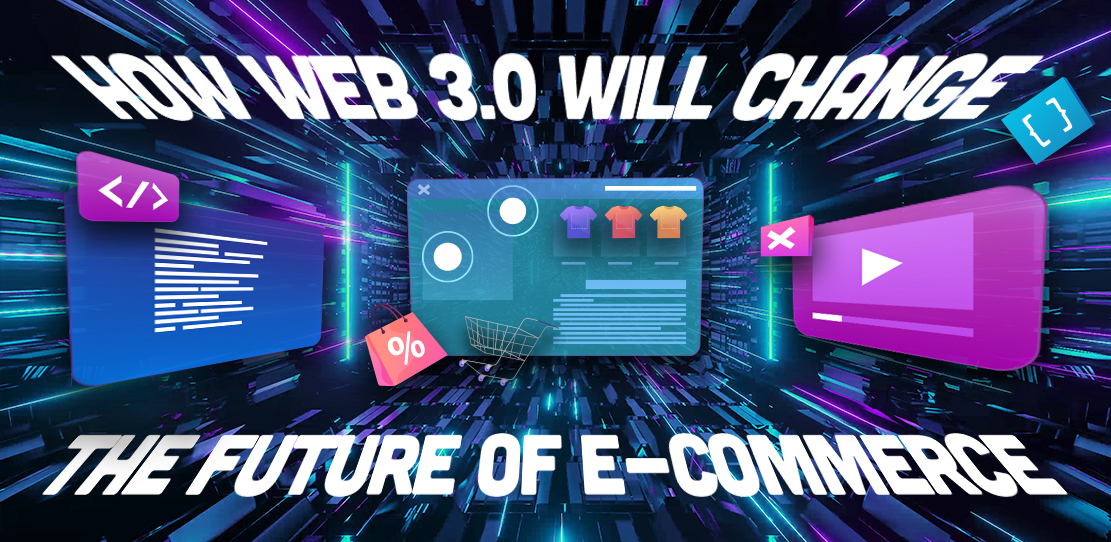
The Web has gone through several iterations over the years. In 1995, we had Web 1.0, which featured static websites, the first versions of email communication, and minimal interaction between users.
2005 brought Web 2.0 and with it, interactive websites, global reach, and the birth of social media. This is the version we currently use every day. Web 3.0 may arrive in 2022 or within five years at least, and will bring many changes with it.
In this article, we’ll discuss the impact of Web 3.0 on the e-commerce industry.
Effects of Web 3.0 on E-commerce
The Web Will Become More Open
One thing that will affect websites, including e-commerce sites, is that the Web will become an open-source network. This means that all users will be able to see the source code, make useful changes, and create an open community. This allows for a more inclusive and creative community of users, sellers, and customers.
Semantics Will Improve the User Experience
Web 3.0 is also called the Semantic Web. This is due to its use of machine learning and artificial intelligence to create a more useful experience for users. These technologies will show users content that is more relevant to them. This will also allow e-commerce sellers to show their content to the right audience and fill their pipelines with their ideal customers.
There Will Be Greater Ownership of Assets
E-commerce sellers will soon be able to take ownership of the assets that are important to their business. These assets include photos, videos, reviews, and other types of content. Currently, these may belong to the e-commerce platform that is being used, such as Shopify. But with Web 3.0, sellers will take ownership of these assets and their digital storefront will truly belong to them.
Loyalty Programs Will Become More Personalized
Loyalty programs are a great tool for any e-commerce business to encourage repeat business and referrals. The blockchain capabilities brought to the industry by Web 3.0 will personalize these programs for each user, while automating them at the same time. Purchasing history and preferences set by the user will inform the technology on how to personalize these programs.
Transactions Will Become More Secure
Blockchain technology is inherently more secure than the systems used by most platforms currently. Online shoppers leave a massive trail of personal information, any of which could become compromised at any time. With blockchain, this information becomes much more secure. This helps sellers keep their customers’ identities safe at all times.
There Will Be Greater Transparency
Blockchain technologies improve transparency on all levels. Sellers will be more transparent to their customers, which improves trust. Vendors and suppliers will also become more transparent toward sellers, improving communication in that professional relationship. Warranties are one area that will greatly benefit from transparency — suppliers, sellers, and customers will all be able to access the specific things that are covered in the brand’s warranty policies, reducing potential miscommunication.
Web 3.0 Will Integrate Voice Assistants and AR/VR Technologies
Similar to artificial intelligence and machine learning, other technologies will improve the user experience. These include voice assistants, augmented reality, and virtual reality technologies. These technologies make it easier for customers to find exactly what they’re looking for and make purchases seamlessly. They also make online shopping more fun and allow customers to connect on a deeper level with brands. One way that we’re already seeing this development is with the onset of the Metaverse. Brands are already competing for digital space where they can sell their products in the Metaverse.
Product Recommendations Will Become More Personalized
One of the perks of shopping on Amazon’s website is the related products feature — the platform can recommend related products that a customer might be interested in. Web 3.0 can bring this functionality to more e-commerce sites, enabling more cross-selling and turning new customers into loyal repeat customers. These recommendations will be highly personalized based on a customer’s purchase history and preferences, similar to how blockchain will personalize loyalty programs. After purchasing a few products that are recommended and turn out well, the customer will connect with the brand and come to trust them. They will continue to buy new products from you and come to trust your brand more and more.
What’s Next?
This is a lot of information to take in at first. But there are a few ways that e-commerce sellers can prepare for Web 3.0:
- Learn about new technologies. Take the time to start learning about technologies like blockchain, artificial intelligence, machine learning, augmented reality, and virtual reality.
- Learn how to implement these technologies and train your staff. Once you know how these technologies work and how they will benefit you, start learning how to get started with them. Make sure to train your staff so that they can use them without having to call you every time.
- Adopt a multi-channel approach. Consider which channels serve you well now — such as social media and video — and combine them with new technologies. This will allow you to diversify your approach and avoid relying on any one technology.
Conclusion
Web 3.0 is bringing a lot of changes to the e-commerce industry. Through the use of blockchain and other technologies, customers will find their shopping experience to be easier, as well as being more personalized, secure, and transparent. E-commerce sellers will also see greater transparency with their vendors and other professionals that they work with. They will also actually own their media and other assets, rather than platforms owning them. Blockchain offers a lot of benefits for customers, sellers, and suppliers. To take advantage of these perks, e-commerce brands should learn about new technologies and how to use them, then include their team in the process before adding the new technologies to their existing channels and techniques.
Need help with your current e-commerce marketing? OperationROI is an e-commerce marketing agency that helps brands and sellers increase sales online. Schedule a call today if your products and marketing are underperforming. Not sure you need a marketing agency, then you should read what our clients have to say about OperationROI.
Schedule A Call Today






The emergence of Web 3.0 and blockchain technology brings forth numerous opportunities for the eCommerce industry. These innovations offer improved security, increased transparency, streamlined supply chains, tokenization of assets, decentralized marketplaces, and enhanced customer data protection. As these technologies continue to evolve, we can expect a more secure, efficient, and user-centric eCommerce ecosystem in the near future.
Hi Sashi,
Thank you for highlighting the exciting prospects that Web 3.0 and blockchain technology bring to the eCommerce industry! Your post underscores the potential for enhanced security, transparency, and customer data protection. It’s an exciting glimpse into the future of eCommerce, and we appreciate your insightful contribution to our blog.
Greg